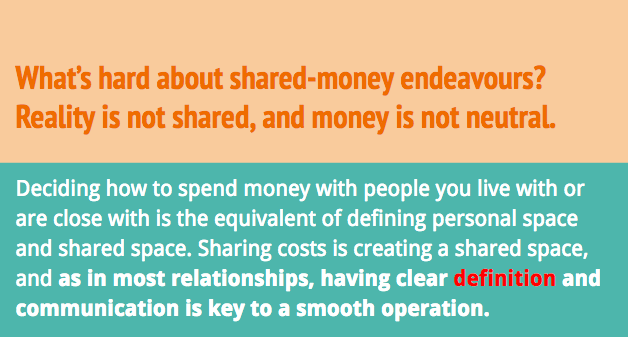I talk with a lot of artists, couples, and collective houses about the variations of accountable and transparent money sharing structures that they might choose to work with. Sharing costs is usually something we associate with people we live with — but it also happens with friends a lot too, right? Of course there’s movies, dinner, treats: I know I spend with (and on) friends often — and it makes me happy. Beyond the everyday stuff, it’s my friends with whom I take on large projects – the kind that need money to happen. Projects that may need to pay people to be accountable to the time people put in. Projects that require capital which someone needs to front comfortably without using it as leverage.
What’s hard? Money is not neutral.
So, what kind of conversations are we having with our friends about money? Are they the ones we want to be having? Have you agreed on what you’re talking about? Here’s three things I’d love it if you got shared definitions of when negotiating to create a big project:
Class — are you talking about your class backgrounds in the same ways, using the same metrics? You could try a “I grew up ____ and now I’m ____” model to account for changes in people’s class experience over time.
Resources — are you including anticipated income or the reason for one person’s ability to work less when calculating splits in payments? If someone has a lot of income but spends it all on student loans, or someone has less because they have family support, consider what’s fair given a whole-resource picture.
Expectations — what do people hope to get out of the project or home experience? Who takes out the trash is both a metaphor and an actual item to figure out.
What’s easy? Values are shared.
Here’s an example: I was recently at a conference and ended up at a table with friends, all of whom come from working-class backgrounds who now work in the tech industry. And we were talking about what the heck they were thinking of doing WITH that tech money: collective housing for our weirdo aging selves was on the list. Accountable sharing of resources also came up (check out this blogger’s plan they came up with). What would be on your list of things you’d share with friends based on your shared values?
Here’s another example: When I toured with Heels on Wheels, we learned to come up with a transparent profit (or “profit” — it was queer art after all) split that was shared with everyone ahead of time: 20% for 2 organizers, 10% for 4 more performers & the tour manager, 10% for the organization. At the end of the day, since everyone was making such little money off the gig it was easy to be transparent — but more so it was easy since we also had a shared value of respect for labor, sliding scale for shows, and economic justice in general.
PRO TIPS
- Explicit agreements, written down, benefit everyone. They can be referred to as needed, and should be changed with equal transparency.
- Decision-making on how much will be spent when (and by whom) is best done ahead of time, but when time is of the essence can be expedited with best intentions informed by agreements.
- The things we say we’ll do with money, especially when we have a little more, matter. Our follow through in those moments is trust building in a world where money tends to have strings, non-consentual activities, and disappointment.

Deciding how to spend money to create home or projects with people you live or are close with is the equivalent of defining personal space and shared space.
Sharing costs is creating a shared space, and as in most relationships, having clear communications is key to smooth operation.